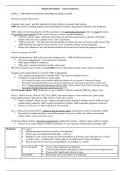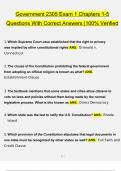Summary
Summary Dispute Resolution SQE1
Clear, precise, detailed, yet concise, Dispute Resolution summary for SQE students. I have devoted so much time and energy to writing these notes-summaries that eventually they paid off. Not only they allowed me to pass my PDGL with a distinction, but they were key to studying for the SQE exam. My ...
[Show more]




